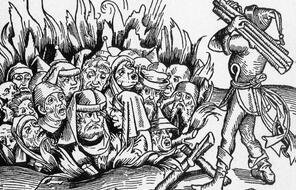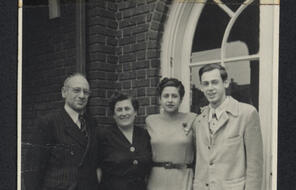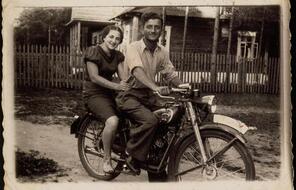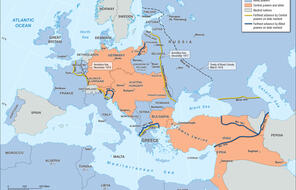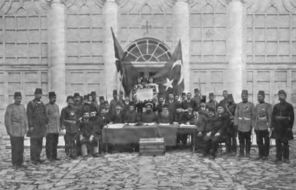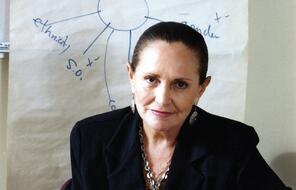The Danger of a Single Story (UK)
Updated
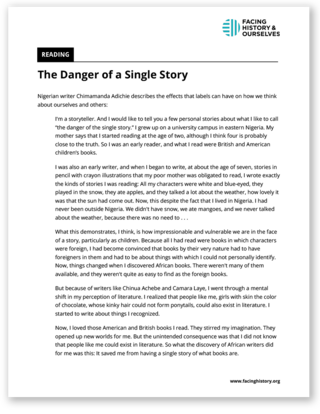
"The Danger of a Single Story" Reading
Chimamanda Ngozi Adichie is a writer who has won several awards for her novels, short stories, and essays. She was born in Nigeria, and she attended universities in both Nigeria and the United States. She continues to live in both countries. In her TED Talk ‘The Danger of a Single Story’, Adichie describes the effects that labels can have on how we think about ourselves and others.
I come from a conventional, middle-class Nigerian family. My father was a professor. My mother was an administrator. And so we had, as was the norm, live-in domestic help, who would often come from nearby rural villages. So, the year I turned 8, we got a new house boy. His name was Fide. The only thing my mother told us about him was that his family was very poor. My mother sent yams and rice, and our old clothes, to his family. And when I didn’t finish my dinner, my mother would say, ‘Finish your food! Don’t you know? People like Fide’s family have nothing.’ So I felt enormous pity for Fide’s family.Then one Saturday, we went to his village to visit, and his mother showed us a beautifully patterned basket made of dyed raffia that his brother had made. I was startled. It had not occurred to me that anybody in his family could actually make something. All I had heard about them was how poor they were, so that it had become impossible for me to see them as anything else but poor. Their poverty was my single story of them.
Years later, I thought about this when I left Nigeria to go to university in the United States. I was 19. My American room-mate was shocked by me. She asked where I had learnt to speak English so well, and was confused when I said that Nigeria happened to have English as its official language. She asked if she could listen to what she called my ‘tribal music’, and was consequently very disappointed when I produced my tape of Mariah Carey [an American pop singer]. She assumed that I did not know how to use a stove.
What struck me was this: She had felt sorry for me even before she saw me. Her default position toward me, as an African, was a kind of patronising, well-meaning pity. My room-mate had a single story of Africa: a single story of catastrophe. In this single story, there was no possibility of Africans being similar to her in any way, no possibility of feelings more complex than pity, no possibility of a connection as human equals.
I must say that before I went to the US, I didn’t consciously identify as African. But in the US, whenever Africa came up, people turned to me. Never mind that I knew nothing about places like Namibia. But I did come to embrace this new identity, and in many ways I think of myself now as African…
So, after I had spent some years in the US as an African, I began to understand my room-mate’s response to me. If I had not grown up in Nigeria, and if all I knew about Africa were from popular images, I too would think that Africa was a place of beautiful landscapes, beautiful animals, and incomprehensible people, fighting senseless wars, dying of poverty and AIDS, unable to speak for themselves and waiting to be saved by a kind, white foreigner. I would see Africans in the same way that I, as a child, had seen Fide’s family…
And so, I began to realise that my American room-mate must have throughout her life seen and heard different versions of this single story…
But I must quickly add that I too am just as guilty in the question of the single story. A few years ago, I visited Mexico from the US. The political climate in the US at the time was tense, and there were debates going on about immigration. And, as often happens in America, immigration became synonymous with Mexicans. There were endless stories of Mexicans as people who were fleecing the healthcare system, sneaking across the border, being arrested at the border, that sort of thing.
I remember walking around on my first day in Guadalajara, watching the people going to work, rolling up tortillas in the marketplace, smoking, laughing. I remember first feeling slight surprise. And then, I was overwhelmed with shame. I realised that I had been so immersed in the media coverage of Mexicans that they had become one thing in my mind, the abject immigrant. I had bought into the single story of Mexicans and I could not have been more ashamed of myself. So that is how to create a single story, show a people as one thing, as only one thing, over and over again, and that is what they become.
It is impossible to talk about the single story without talking about power. There is a word, an Igbo [a language spoken in Nigeria] word, that I think about whenever I think about the power structures of the world, and it is ‘nkali’. It’s a noun that loosely translates to ‘to be greater than another’. Like our economic and political worlds, stories too are defined by the principle of nkali: how they are told, who tells them, when they’re told, how many stories are told, are really dependent on power.
Power is the ability not just to tell the story of another person, but to make it the definitive story of that person … [T]he truth is that I had a very happy childhood, full of laughter and love, in a very close-knit family.
But I also had grandfathers who died in refugee camps. My cousin Polle died because he could not get adequate healthcare. One of my closest friends, Okoloma, died in a plane crash because our fire trucks did not have water. I grew up under repressive military governments that devalued education, so that sometimes, my parents were not paid their salaries. And so, as a child, I saw jam disappear from the breakfast table, then margarine disappeared, then bread became too expensive, then milk became rationed. And most of all, a kind of normalised political fear invaded our lives.
All of these stories make me who I am. But to insist on only these negative stories is to flatten my experience and to overlook the many other stories that formed me. The single story creates stereotypes, and the problem with stereotypes is not that they are untrue, but that they are incomplete. They make one story become the only story.
Of course, Africa is a continent full of catastrophes: there are immense ones, such as the horrific rapes in Congo, and depressing ones, such as the fact that 5,000 people apply for one job vacancy in Nigeria. But there are other stories that are not about catastrophe, and it is very important, it is just as important, to talk about them.
I’ve always felt that it is impossible to engage properly with a place or a person without engaging with all of the stories of that place and that person. The consequence of the single story is this: It robs people of dignity. It makes our recognition of our equal humanity difficult. It emphasises how we are different rather than how we are similar.
So what if before my Mexican trip, I had followed the immigration debate from both sides, the US and the Mexican? What if my mother had told us that Fide’s family was poor and hard-working? What if we had an African television network that broadcast diverse African stories all over the world?…
…What if my room-mate knew about the female lawyer who recently went to court in Nigeria to challenge a ridiculous law that required women to get their husband’s consent before renewing their passports? What if my room-mate knew about Nollywood, full of innovative people making films despite great technical odds, films so popular that they really are the best example of Nigerians consuming what they produce? What if my room-mate knew about my wonderfully ambitious hair braider, who has just started her own business selling hair extensions? Or about the millions of other Nigerians who start businesses and sometimes fail, but continue to nurse ambition?
Every time I am home I am confronted with the usual sources of irritation for most Nigerians: our failed infrastructure, our failed government, but also by the incredible resilience of people who thrive despite the government, rather than because of it. I teach writing workshops in Lagos every summer, and it is amazing to me how many people apply, how many people are eager to write, to tell stories…
Stories matter. Many stories matter. Stories have been used to dispossess and to malign, but stories can also be used to empower and to humanise. Stories can break the dignity of a people, but stories can also repair that broken dignity.
The American writer Alice Walker wrote this about her Southern relatives who had moved to the North. She introduced them to a book about the Southern life that they had left behind. ‘They sat around, reading the book themselves, listening to me read the book, and a kind of paradise was regained.’ I would like to end with this thought: that when we reject the single story, when we realise that there is never a single story about any place, we regain a kind of paradise. 1
This reading is also viewable as a video.
Connection Questions
- Create an identity chart for Chimamanda Adichie. Which labels on the chart represent how she sees her own identity? Which ones represent how some others view her?
- What does Adichie mean by a “single story”? What examples does she give? Why does she believe “single stories” are dangerous?
- Is there a single story that others often use to define you? Can you think of other examples of “single stories” that may be part of your own worldview? Where do those “single stories” come from? How can we find a “balance of stories”?
- Adichie herself admits to sometimes defining others with a single story. Why is it that people sometimes make the same mistakes that they so easily see others making?
- 1Chimamanda Adichie, “The Danger of a Single Story,” TED video (filmed July 2009, posted October 2009), 18:49, accessed March 28, 2016.
How to Cite This Reading
Facing History & Ourselves, “The Danger of a Single Story (UK)”, last updated August 2, 2016.



